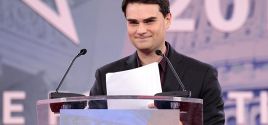Nobel laureate scientist defines future vaccines as "food"Editor: Xiong TongXinhuanet Jun. 21, 2010 |
Popular 
'More Winning!' Ben Shapiro Celebrates Trump Assembling an Israel First Cabinet

Report: Trump Picks Kristi Noem to Head DHS

Trump Picks Jewish Real Estate Investor Steve Witkoff for Middle East Envoy

Trump Picks Matt Gaetz for Attorney General

Trump Picks Fox News Host Pete Hegseth for Secretary of Defense
 WUXI, Jiangsu, June 20 (Xinhua) -- Barry J. Marshall, Nobel Laureate in Physiology or Medicine 2005 and clinical professor with the University of Western Australia, said people might, in the future, be vaccinated by swallowing capsules instead of by using needles. He made his remarks at the World Expo's third theme forum, which opened on Sunday in Wuxi, east China's Jiangsu Province. "The project I've been working on is to develop vaccines that look like a food product. I think that's the future beyond the needles, to have vaccines look more like food," he said. "I worry about my family. I have a grandson. Recently he had five needles on one day. It's very stressful for small children to have vaccination needles, so it would be much better if we could have vaccines like medicines," he said. "You don't have to go to the hospital or doctor, maybe you could go to the pharmacy or drug store or the super market," he said. "Ten or 20 years from now, probably many vaccines would be like that, so much easier for so many people not have to worry about influenza, measles, chickenpox," he said. "For example, one project we are undertaking showed some early successes in animals. The project is that we can take the influenza virus genes, put them into the bacteria so the bacteria look a little bit like influenza, then feed the bacteria to somebody," he said. "You could see in the future this could be like some food product, capsule bacteria. But when you swallow it, it will start living in your stomach for a few weeks. During that time, your immune system will be activated but you will also be vaccinated against influenza," he explained. In 2005, Barry J. Marshall and J. Robin Warren were awarded the Nobel Prize for Physiology or Medicine in recognition of their 1982 discovery that a bacterium, Helicobacter pylori, is one cause of mankind's most common and serious diseases, peptic ulcer disease. |



